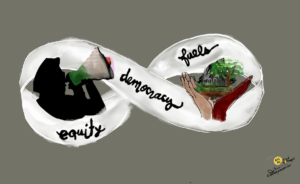Changing the Economics of Higher Education

Yes, college degrees are worth obtaining. On average a diploma is worth a lot in earning power. But American higher education is rapidly losing its return on investment. The combination of the Great Recession, rampant and prolonged higher ed inflation, and the proliferation of free and cheap anywhere anytime learning resources makes most US universities overpriced for what most students get out of the experience.
Sal Kahn talked to the Wall Street Journal’s Walt Mossberg about how technology might be part of the solution.
On the sustainability question…I think the elites will probably do just fine, but for the bulk of universities, nothing can grow 5% faster than inflation forever. It will just take over the world, and that’s what’s happening now. There is a fundamental disconnect happening between the providers of education and the consumers of education. If you ask universities what they are charging the $60,000 for, they’ll say, “Look at our research facilities. Look at our faculty. Look at the labs and everything else.” And then if you ask the parents and the students why they are taking on $60,000 of debt, they’ll say, “Well, I need the credential. I need a job.” So one party thinks they’re selling a very kind of an enriching experience, and the other one thinks that they’re buying a credential. And if you ask the universities what percentages of your costs are “credentialing,” they say oh, maybe 5% to 10%. And so I think there’s an opportunity if we could decouple those things—if the credentialing part could happen for significantly less.
Yesterday I reviewed Game Changers–Education & IT, a good summary of how some universities using technology to improve their offerings. Most were featured case studies were incremental not transformational applications of new tech. Product improvement will help many institutions hang on longer, but Khan is pointing to transformation change that is taking place in four categories: super-low cost post-sec, competency-based credits, job certification, and degree alternatives.
- Super low-cost post-sec: Coursera and Udacity have been grabbing headlines lately with massively open online courses (MOOC). Take courses from top profs and pay if you want a test to earn credit. In a blog on productive post-secondary I recently noted University Now joined StraighterLine and in the $100/mo or $1000/yr category. Pearson powers Propero, a low cost higher ed solution that will be most often deployed by community colleges looking for ways to compete in the DIY space.
- Competency-based credits: Low cost higher ed options are following the lead of competency-based Western Governors University. Rio Salado and ASU were recognized last week at a New America Foundation meeting for granting credit for knowledge and skills earned outside a formal degree program. Combinations of free and low cost learning experiences combined with a rapidly increasing number of colleges willing to test and grant credit (for a small fee) will make this a big growth category.
- Job certification: Outgrowths of the UK secondary testing system, often administered by Edexcel, have made prof-tech certification common across the Commonwealth countries. New skills recognition system are emergine on Mozilla badge platformr including the P2PU.org web design and development program. TheBusinessTest.com wants to certify your business knowledge and it could be used in conjunction with or instead of a degree.
- Degree alternatives: In addition to Khan Academy, there has been an explosion of anything, anytime learning resources. In some cases, a collection of learning experiences and resources will replace degrees as a market signaling device. E[nstitute] suggests that you skip college and go to work in a hot NYC startup (and they got a little more HuffPo love recently.) The combination of startup-relevant topics, expert instructors, and great peer learning makes GeneralAssemb.ly an MBA killer and now they are online.
To this list you could add more sophisticated hiring strategies that are getting better at surfacing and differentiating between candidates using reliable measures of knowledge and skills. When you know what people can do it doesn’t matter where they went to school.
Like Sal, I think skill credentialing and related alternative signaling will grow rapidly and, with online learning and open resources, will put immense pressure on bloated traditional higher ed.
Glenn Harlan Reynolds thinks there is a higher ed ‘bubble.’ The University of Tennessee law professor, believes college has become, for many, merely a “status marker” signaling membership in the educated caste, and a place to meet spouses of similar status — “associative mating.” In The Higher Education Bubble, Reynolds says this bubble exists for the same reasons the housing bubble did. It is not a perfect analogy–degrees are not a clean asset class like houses. The bubble won’t pop quickly, nervous and wealthy parents will overpay for another generation.
However, students will increasingly take advantage of better low cost alternatives draining overpriced colleges of enrollment. If you run a third tier college you need to plan for a radical change agenda or a going out of business sale.






0 Comments
Leave a Comment
Your email address will not be published. All fields are required.